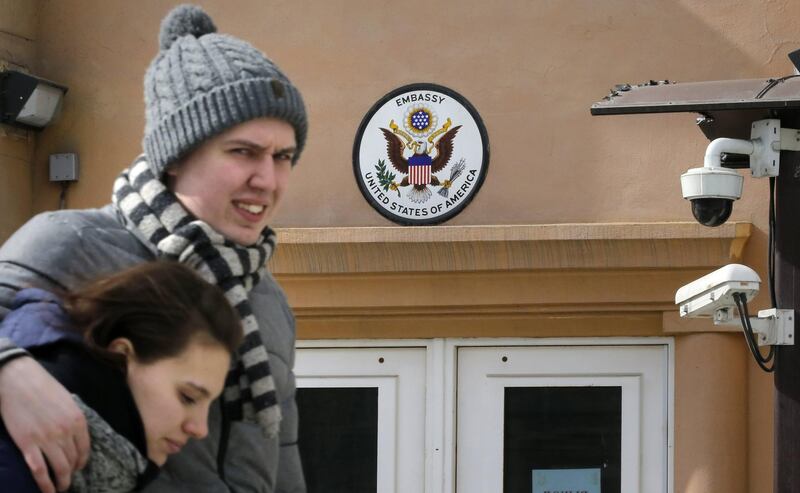Prime minister Theresa May thanked the American president Donald Trump in a telephone call on Wednesday for his country’s actions in support of Britain in light of the nerve gas attack in Salisbury which has left a former Soviet spy and his daughter critically ill in hospital.
On Monday, America led the way in a global response against Russia, the country widely perceived to be behind the assassination attempt against Sergei and Yulia Skripal, expelling scores of diplomats from the country and closing the Russian consulate in Seattle.
The prime minister’s spokesman said on Wednesay night that “Theresa May today spoke with President Trump to welcome the US decision to expel 60 Russian diplomats in response to the use of a nerve agent in Salisbury.
“The PM said the US had delivered a very strong response and welcomed the breadth of international action in response to Russia’s reckless and brazen behaviour – with 26 countries now putting expulsions in place.”
_______________
Read more:
[ UK to extend national security strategy to organised crime and 'corrupt elites' ]
_______________
The White House said that the “two leaders agreed on the importance of dismantling Russia’s spy networks in the United Kingdom and the United States to curtail Russian clandestine activities and prevent future chemical weapons attacks on either country’s soil.”
In a separate conversation with the German chancellor Angela Merkel, Mrs May thanked her German counterpart for her strong support and solidarity following the Salisbury attack.
According to Downing Street, the chancellor and prime minister both agreed on the need to continue to work together to counter increased Russian aggression.
And in a speech to the Lord Mayor’s Easter Banquet on Wednesday night, foreign secretary Boris Johnson hailed the 27-nation coalition which has acted against Russia.
“It seems clear that the Kremlin underestimated the strength of global feeling,” Mr Johnson told his audience. “If they thought that the world had become so hardened and cynical as not to care about the use of chemical weapons in a peaceful place like Salisbury, if they believed that no one would give a fig about the suffering of Sergei and Yulia Skripal or that we would be indifferent to the reckless and contemptuous disregard for public safety that saw 39 others seek medical treatment, if they believed that we had become so morally weakened, so dependent on hydrocarbons, so chronically risk averse and so fearful of Russia that we would not dare to respond, then this is their answer.
“Because these countries know full well that they face the risk of retaliation and frankly there are countries that have taken action that are more vulnerable to Russia than we are, whether through geography or their energy needs, and I pay tribute to them because they know that their own Russia-based diplomats, and their families, must now deal with the possibility of their own lives being turned upside down.”
In other developments in the story, Mr Skripal’s niece, Viktoria, told the BBC that the pair faced a bleak medical prognosis, saying their chances of survival “really [aren’t] good” following the attack with the nerve agent Novichok on March 4.
Ms Skripal said: “Out of 99% I have maybe 1% of hope. Whatever it was has given them a very small chance of survival. But they’re going to be invalids for the rest of their lives.”
British police also announced late on Wednesday that they were confident they knew how the Skripals had been poisoned.
Deputy assistant commissioner Dean Haydon, the senior national coordinator for counterterrorism policing, said: “At this point in our investigation, we believe the Skripals first came into contact with the nerve agent from their front door.
“We are therefore focusing much of our efforts in and around their address. Those living in the Skripals’ neighbourhood can expect to see officers carrying out searches as part of this but I want to reassure them that the risk remains low and our searches are precautionary.”
Meanwhile, more than 20 nations have now announced the expulsion of more than 150 Russian diplomats in the dispute, and the Russian reaction is being eagerly awaited.
Britain expelled 23 and Russia retaliated with the same number, but it has not responded to the other moves.
Montenegro on Wednesday announced it would expel a Russian diplomat. Slovakia and Malta said they would recall their ambassadors from Russia.
Russia’s deputy foreign minister Sergei Ryabkov said Moscow is in “no rush” to retaliate.
He told the RIA Novosti state news agency that Russia is “thoughtfully and thoroughly” considering its response. Separately, he was quoted by the Interfax news agency as saying the expulsions were directed by London and Washington, adding that other nations succumbed to their pressure. He added that “all options are on the table” regarding Russia’s response.
President Vladimir Putin’s spokesman, Dmitry Peskov, told reporters that Russia’s response would come soon and that it will be “timely and will suit the interests of Russia.”







